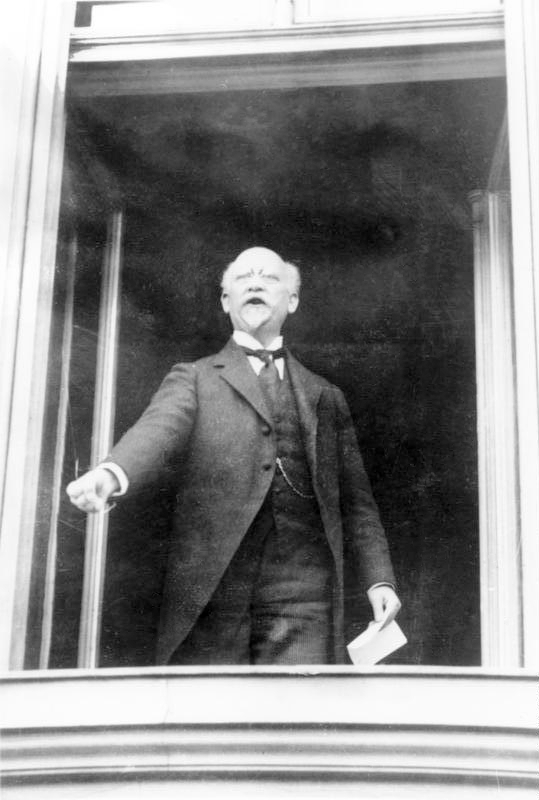
Proclamation of the republic in Germany
The proclamation of the republic in Germany took place in Berlin twice on 9 November 1918, the first at the Reichstag building by Philipp Scheidemann of the Majority Social Democratic Party of Germany (MSPD) and the second a few hours later by Karl Liebknecht, the leader of the Marxist Spartacus League, at the Berlin Palace.
In the German Revolution of 1918–1919, during which Social Democrats and Spartacists were among the groups that fought to determine the country's future form of government, it was the MSPD and the ideas of the bourgeois-democratic parties that prevailed over the Spartacists and their more radical idea of a soviet-style republic. The German Empire was transformed from a monarchy into a parliamentary-democratic republic with a liberal constitution. Scheidemann's speech marked the point at which the Empire could be said to have ended and the Weimar Republic, the first republic to include the entire German nation-state,[1] to have been born.
Aftermath[edit]
The MSPD leadership initially succeeded in persuading the USPD to join them in an interim government, the Council of the People's Deputies. The three USPD members resigned from the council on 29 December 1918 due to disagreements with the MSPD and were replaced by two additional MSPD members. January 1919 saw the Spartacist uprising, in the course of which the MSPD leadership deployed right-wing Freikorps troops against the left-wing revolutionaries. On 19 January, elections were held for the Weimar National Assembly. It drafted the Weimar Constitution which came into force on 11 August 1919. Article 1 begins with the sentence, "The German Reich is a republic". Despite both the strong desire among many Germans to restore the monarchy and the failure in 1933 of the Weimar Republic, there were never any serious efforts to return to an imperial form of government.
In the course of the Spartacist uprising, on 15 January 1919, Karl Liebknecht and Rosa Luxemburg were murdered, with Friedrich Ebert's approval, by members of the Guard Cavalry Rifle Division. Scheidemann became a hated figure in German nationalist and ethnic circles. An assassination attempt was made on him in 1922. After Adolf Hitler seized power in 1933, he fled into exile in Denmark. His name was on the first expatriation list of the Nazi regime on August 25, 1933.[21] Scheidemann died in Copenhagen in 1939.